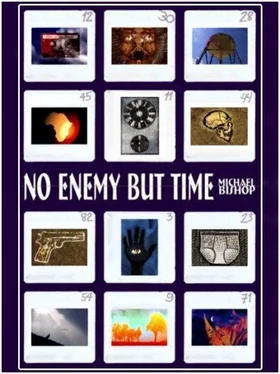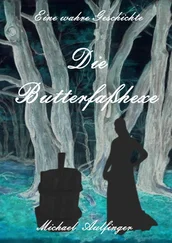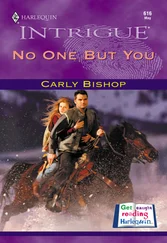I recognized by sight each one of the adult Minids. In addition to christening the band’s obvious head honcho Alfie, I had assigned the following monickers to its menfolk: Ham, Jomo, Genly, Malcolm, Roosevelt, and Fred. Ham and Jomo were the two oldest Minids, if their creased faces and salt-and-pepper manes were reliable indices of age. Genly was the habiline who had given me so intense a scrutiny after the fateful pistol-shot incident, while Roosevelt was the unfortunate soul whose sphincter muscle had betrayed him. Malcolm, he of the red-black goatee and pencil-point eyes, had served as sentry the day I discovered the original Helensburgh, and Fred was the youngest of the hunters, a hobbit with a permanently dislocated jaw and a wide gap in his front teeth—as if in bygone days he had run afoul of one of his elders’ more emphatic fits of pique.
The ladies I named in this wise: Dilsey, Guinevere, Emily, Miss Jane, Odetta, and Nicole. Dilsey and Guinevere were the consorts of, respectively, Ham and Jomo. Guinevere was the harridan who had given Helen such an extended tongue-lashing on my first afternoon as a spy. Since that time I had developed a more favorable opinion of her. In fact, I had even begun to suspect that she was Helen’s mother. Emily, Genly’s wife, struck me as the inveterate sexpot among the distaff Minids, a lady with a roving eye and a wandering backside. She was Alfie’s favorite, although he too apparently appreciated a carnal smorgasbord. Miss Jane, Odetta, and Nicole had made a single distinctive impression on me: They were excellent mothers, tenacious in their children’s defense, and amiably feisty in their dealings with the menfolk.
As for the children, I had not yet familiarized myself with all of them beyond the point of assigning names.
The oldest among them, probably Dilsey’s offspring, was an adolescent male whom I called Mister Pibb.
Thereafter the children, toddlers, and babies got mixed up in my mind, but the names I eventually wrote on the genealogy page of my reduced-print Bible and field guide included Jocelyn, Groucho, Duchess, Bonzo, Pebbles, Zippy, Gipper, and A.P.B.
A.P.B. was Fred and Nicole’s baby. His initials stood alternately for Alistair Patrick Blair and All Points Bulletin, the latter earned by the shrillness of his demands to be given suck.
Twenty-three habilines in all (for I had been counting the Minids). I was their first cousin, two million years removed, come home for a visit, and they refused to acknowledge me. I was also beginning to wonder if I had become a nonentity to my colleagues in the dream territory of the twentieth century.
Perhaps, for them, I had never existed….
* * *
I, Joshua Kampa, was extinct on my feet. The invisible man, another country’s native son, cut off from his roots in the primeval Kane’an. A has-been, a may-one-day-be, a dreamfaring dodo bird, and I might have to stay.
Two days running at the end of a week, I returned to Lake Kiboko to see if Kaprow had lowered the Backstep Scaffold for me, and it still did not descend. But I was beginning to feel a part of both the Pleistocene and the habilines to whose band I now wanted to be admitted for more than solely scientific reasons. And at length I managed a minor breakthrough with Roosevelt, the young male who had reacted to my pistol shot by soiling himself. He did not lack courage in more commonplace bush-country situations. In fact, at catching birds and tracking small game such as hyraxes and hares, he seemed to me one of the most adept of all the habilines. Often, in the early evening, he did not scruple to carry out solitary hunting expeditions—as much for his own private pleasure as for the trophies he might bring home. For safety’s sake he kept these outings brief and did not venture very far from New Helensburgh, but by persistent observation I learned of his penchant for such trips and determined to act upon my knowledge by shadowing him.
Alert to my clumsy trailing tactics, Roosevelt usually made sure that I got no closer than sixty or seventy yards. On at least four occasions, after spotting me he gave up the hunt and sauntered home with a kind of wounded dignity. I was forever associated in his mind with loud noises and the terrible humiliation of independently functioning bowels. However, the terrain came to my rescue. The veldt below New Helensburgh abounded in kopjes, those granite outcroppings showing either bare rock or an austere covering of scrub. I began using them as blinds, as the Minids and other predators habitually did, and it is to a kopje and my own improving stealth that I owe my first successful tête-à-tête with Roosevelt.
Roosevelt had just caught a hare by a technique that Babington had tried to teach me in Lolitabu, a technique I had not yet mastered. It involves observing a spring hare’s half-cocked ears as you run behind it in full pursuit. As soon as the hare flattens its ears against its neck, you jump to either the right or the left and open your hands for a possible capture. The flattening of the ears is an infallible sign that the hare is going to “jink,” or turn, and by jumping to one side you give yourself a fifty-fifty chance of intercepting it. On this occasion Roosevelt’s intuitive leap to the right proved correct, and the hare forfeited its life to the Minid’s quick and brutal hands. I witnessed the denouement of this primal drama from the slope of a barren kopje overlooking the plain.
Carrying the dead hare by one of its hind legs, Roosevelt approached my outcropping and squatted just beneath me in the lee of its overhang. He had decided to eat his catch in solitude rather than carry it back to camp, where the others would expect and probably receive placatory allotments of the carcass.
Although Odetta, his consort, probably deserved the consideration of a rabbity drumstick, I did not half blame Roosevelt. He had taken the risk and he had won the prize.
I peered down on him with respect and great excitement. Roosevelt, ignorant of my presence, knapped some sharp flakes from a lava cobble and began to perform deft surgery on the limp underside of the hare. The single-mindedness with which he was dismembering his dinner suggested that unless I revealed myself, he would never awaken to the fact that he was being watched. Sheer youthful carelessness on his part, but a break for Joshua Kampa.
Carefully, then, I got to my feet and balanced on the edge of the kopje. The sun was sinking toward Lake Kiboko, and my shadow fell behind me to the east, out of Roosevelt’s line of sight. Catching my breath, I leapt as far out into the savannah as I could and twisted about in midair so as to be facing Roosevelt when I landed. My backpack banged my shoulder blades as, instantly crouching and spreading my arms to prevent the Minid’s escape, I hit the ground. Roosevelt shrieked and dropped the mangled hare. Unfortunately, he also dropped the contents of his lower intestines.
Dear Ngai, I thought. Not again.
I let my backpack slide into the grass behind me and tore off my T-shirt by way of a hasty peace offering. After demonstrating how it might be used to clean one’s backside, I thrust the undershirt toward Roosevelt with many solicitous murmurs and smiles. He regarded the garment with the utmost suspicion and attempted to sidle past me to the right—but I stayed with him, and he seemed to understand that he would have to grapple with me to win his escape. Consequently, he showed me his teeth—his tongue—his liver-colored throat—while the hair along his shoulders and upper arms crackled erect and undulated in the faint twilight breeze. My height advantage seemed irrelevant. I did not want to fight him.
“Take the T-shirt,” I intoned sweetly. “Please take the T-shirt, Roosevelt.”
Against all my expectations, he did, snatching it from my hand as if retrieving something that had belonged to him in the first place. He then set about a swift, comprehensive clean-up campaign, never taking his eyes from my face. A moment later the soiled T-shirt was lying in a wad at my feet and Roosevelt was sidling along the face of the kopje to the left. I moved with him. Our clumsy little waltz was getting neither one of us anywhere. We halted.
Читать дальше



![Ally Carter - [Gallagher Girls 01] I'd Tell You I Love You But Then I'd Have to Kill You](/books/262179/ally-carter-gallagher-girls-01-i-d-tell-you-i-lo-thumb.webp)








